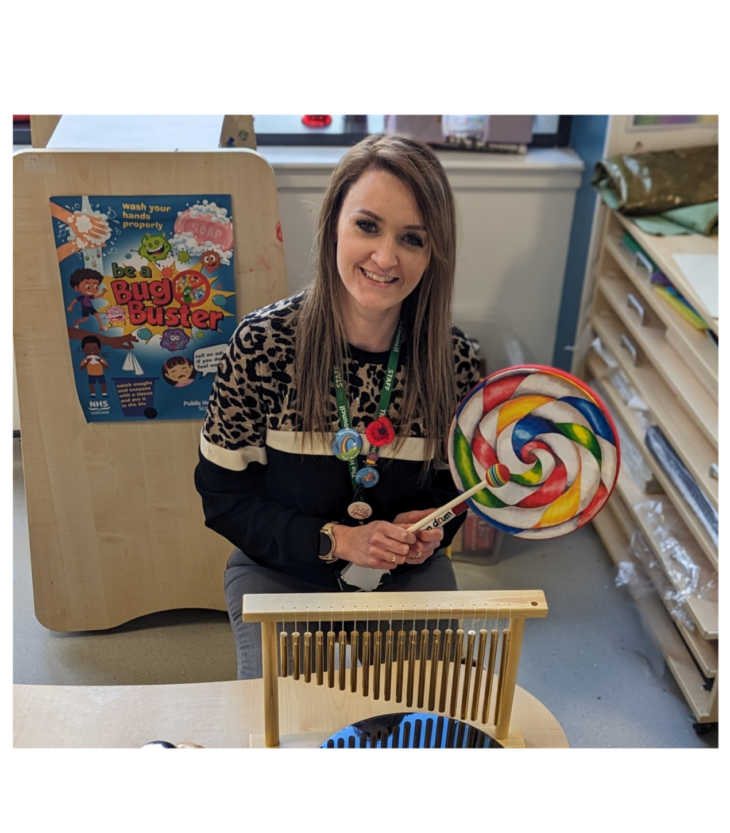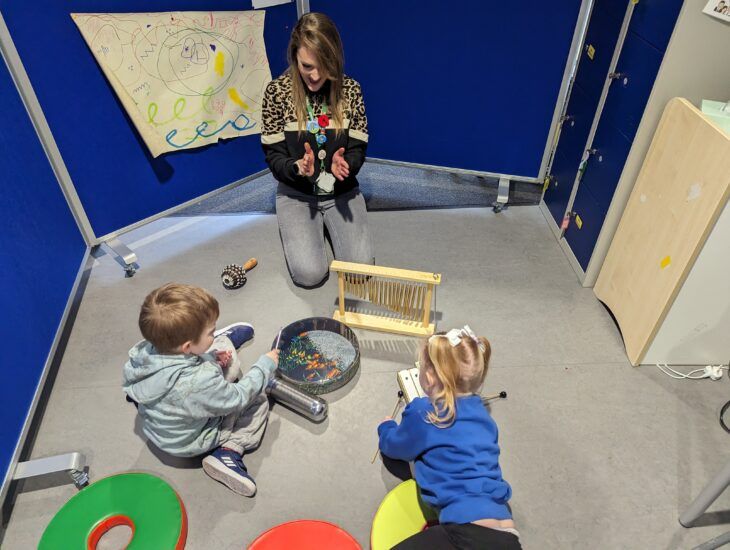Claire’s Story
United Kingdom
- Children
- Disability

Claire MacDonald, a Nursery Practitioner at Caol Primary School in the Scottish Highlands, first received training from Music as Therapy International in November 2021.
The project was a pilot for the charity and the first to focus on mainstream primary aged children. Post-Covid and lockdowns, we hoped that music might provide staff with an additional tool to nurture children’s social and emotional wellbeing after such a prolonged period of disruption to normal life.
Claire works within the school Nursery, supporting a total of 54 pupils, six of whom have a significant level of additional special needs (ASN) and two of whom have English as an additional language. With no specialist ASN facilities or schools supporting primary aged pupils in the region, it is often down to the dedication and expertise of teaching staff like Claire to provide targeted development support which is so important in the early years.
Since completing her introductory music training, Claire has embedded a programme of music into her care provision. She leads weekly music sessions with a group of five ASN children and has also transferred elements of her music training to run a whole class group of 24 children. Both groups get huge enjoyment from the sessions and have already shown positive progress in their confidence, communication skills and ability to regulate their emotions.
The children have found new ways for self-expression through playing the instruments and using their voice. Music provides an outlet for emotion and, for some, an opportunity to self-regulate.
One such child who is part of the weekly group is completely mute in nursery. They often won’t join in with any games or group play and will not express much emotion. When Claire first started out her music sessions, she noted how the child would sit and watch the other children but never take part:
“They would become upset at the end of the session, as though they really wanted to take part but just didn’t have the confidence to. After six weeks of sessions, the child eventually started joining in. They would just play very quietly to begin with, however, each week I can see their confidence growing. They will now play solo as well as in front the group, they will take turns and follow instructions as well as expressing more emotion and will point to instruments that interest them. I really hope with regular sessions the child will continue to grow in confidence to allow them to develop the ability to communicate through more gestures or maybe even words.”

The children have gained crucial listening, communication, and turn-taking skills
Another child who benefits greatly from the interactive music-making sessions has autism. This child finds emotional release in the physical action of banging objects, though too much noise can over-stimulate them. Claire has found that utilising different instruments can help the child to navigate and adjust their emotional state. While a tambourine or drum can allow them to fulfil the impulse of banging and provide release of any built-up energy, switching instruments to a softer windchime or shaker can bring them back to a calmer state before returning to the nursery environment.
Claire has an amazing sense of awareness and understanding of the children and their needs, which is very impressive.”
Clare Reynolds, Music Therapist
Claire was motivated to apply to our Musical Instrument Fund to maximise on the impact of her music sessions. Previously, spending time gathering instruments from the main school building often meant there was less time to focus on the actual music-making with her groups. Now that the nursery is equipped with its own set of musical instruments, the children have access to a wider range of soundscapes, and doubly benefit from longer music sessions.
Claire’s story demonstrates how a commitment to practice can offer group members ongoing therapeutic benefits in a fun and enjoyable way. With music embedded into their weekly routine, the children have a valuable outlet to explore and develop their full potential, gradually building their confidence and communication skills as they do so.
“I’m a Music Star”, read the stickers which Claire had made specially to reward good listening and engagement among group members. We hope that Claire and all her young music stars will continue to enjoy and thrive through music for many years to come.
